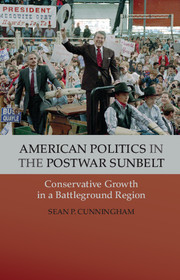Book contents
- Frontmatter
- Dedication
- Contents
- Acknowledgments
- Introduction
- 1 Convergence, Metropolitanization, and Anticommunism
- 2 Race, Rights, and the Liberal Consensus
- 3 Wars against Liberalism
- 4 Southern, Suburban, and Sunbelt Strategies
- 5 Mobilizing the Religious Right in the Politicized “Bible Belt”
- 6 Reagan’s Sunbelt, Reagan’s America
- 7 Shades of Red, Shades of Blue
- Epilogue
- Index
- References
Epilogue
Sunbelt Politics in the Twenty-First Century
Published online by Cambridge University Press: 05 July 2014
- Frontmatter
- Dedication
- Contents
- Acknowledgments
- Introduction
- 1 Convergence, Metropolitanization, and Anticommunism
- 2 Race, Rights, and the Liberal Consensus
- 3 Wars against Liberalism
- 4 Southern, Suburban, and Sunbelt Strategies
- 5 Mobilizing the Religious Right in the Politicized “Bible Belt”
- 6 Reagan’s Sunbelt, Reagan’s America
- 7 Shades of Red, Shades of Blue
- Epilogue
- Index
- References
Summary
The Sunbelt’s political culture continued to evolve as Americans transitioned from the twentieth into the twenty-first century. Economic and political developments were still fueled by rapid population growth, which simultaneously sustained the region’s history of metropolitan-based expansion. Meanwhile, the nation struggled to adjust to the paradigm-shifting implications of the War on Terror, brought on by deadly terrorist attacks in New York City, Pennsylvania, and Washington, D.C., on September 11, 2001, not to mention the transformative impact of the Bush administration’s controversial response to those attacks. As the nation engaged a new set of global conflicts, the political attitudes of those in the Sunbelt also changed. Perhaps most importantly, the region’s white, suburban middle class – so central to the Sunbelt’s growth since the end of World War II – no longer seemed as powerful or as conservative as it had just a few decades before. Although still an influential epicenter for conservative political activism at the regional, state, and local levels, the Sunbelt of the early twenty-first century seemed increasingly ripe for greater political contestation and competitive balance.
One reason for this balance was the rise of what John Judis and Ruy Teixeira have called “postindustrial metropolises” – relatively younger cities driven by technology, university-based research and development, and a cultural willingness to re-embrace the trappings of a limited urbanity, while not entirely abandoning the comforts of modern suburbia. Such places included – but were not limited to – Boulder, Colorado; Austin, Texas; and the areas surrounding California’s Silicon Valley, North Carolina’s Research Triangle, and the Virginia Beltway suburbs adjacent to Washington, D.C. More racially and ethnically diverse than such communities had typically been in the past, these communities increasingly attracted a multicultural array of younger, white-collar, highly skilled professionals groomed in research institutions during the post–civil rights movement and postmodern eras. Many of these young professionals seemed to understand their own careers through a slightly right-of-center economic lens, embracing the concept of regulated capitalism, for instance, while typically rejecting the moral certitude of their parents’ and grandparents’ more socially conservative generations. These young professionals were statistically less likely to attend church on a regular basis and more likely to support liberal Democrats than many ambitious young professionals had been just two decades before.
- Type
- Chapter
- Information
- American Politics in the Postwar SunbeltConservative Growth in a Battleground Region, pp. 257 - 266Publisher: Cambridge University PressPrint publication year: 2014

